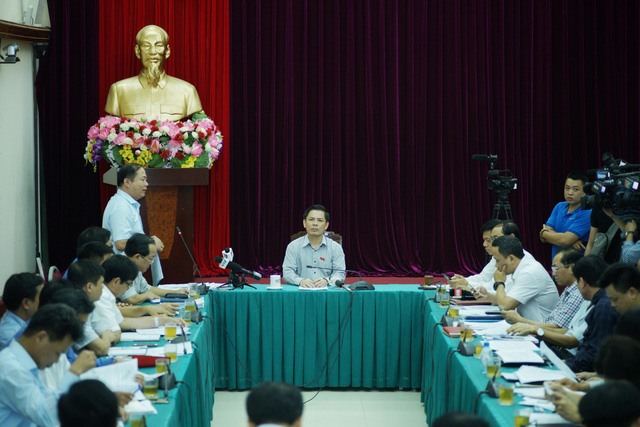 Society
Society

Minister of Transport Nguyễn Văn Thể said yesterday he will take responsibility for recent railway accidents even as he apologised to the families of the victims.
 |
| Minister of Transport Nguyễn Văn Thể apologises to the families of the victims of the recent railway accidents at the meeting on Monday. - Photo dantri.com.vn |
HÀ NỘI — Minister of Transport Nguyễn Văn Thể said on Monday he apologised to the families of the victims in recent railway accident and would take responsibility for what had happened.
Minister Thể also said he would take responsibility for the entire transport sector, and confirmed he would not cover up for individuals who fail to fulfill their responsibilities, which has led to a string of unwanted consequences.
He made the statements at a meeting held late on Monday to investigate four accidents reported between May 24-27, which left two people dead and the operation of the north-south tracks badly disrupted.
Vũ Anh Minh, chairman of Việt Nam Railways (VNR), said the accidents were mainly due to human error.
Vũ Quang Khôi, director of the railway department under the Ministry of Transport, said an average of 45 inspections are conducted yearly, with focus on traffic safety. In 2017, the department handed out fines for 1,040 acts, while 259 fines were imposed in the first five months of this year.
“The railway sector needs to frequently test skill and knowledge of train drivers and operators of railway crossing barriers or gatekeepers,” Khôi said. “The capability of railway rescue teams must also be strengthened.”
Asked about weaknesses of the railway department, Khôi blamed it on the lack of necessary equipment at railway stations, as well as on human resources issues. The department only had 60 railway inspectors scattered along the entire country’s railway line, he said.
Khuất Việt Hùng, deputy chairman of the National Traffic Safety Committee, said individuals in charge of the railway sector should be held responsible for the recent accidents, and not just the barrier keepers who had been prosecuted.
"If we do not insist on holding people in charge of the railway sector and local authorities responsible for letting violations happen, traffic accidents will continue to occur,” Hùng said.
He also said that railway inspectors should be independent from the railway corporation to ensure fairness and transparency.
Deputy Minister of Transport Nguyễn Ngọc Đông said the main cause of accidents was a failure to comply with the disciplinary requirements of the railway sector.
Meanwhile, Đông’s fellow deputy minister, Lê Đình Thọ, mentioned the weakness of the rescue units of the railway industry.
“After the accidents, there was no quick rescue response, leading to ineffective cooperation for rescue work,” Thọ said.
He also said the recent problems of the railway industry were an offshoot of the monopoly held by VNR.
"These accidents were definitely due to human errors,” Thọ said.
Minister Thể acknowledged the views given by experts and officials and asked railway sector leaders to seriously review and verify the causes of recent accidents.
He also assigned Đông to set up a team to review inappropriate regulations regarding railway management. The team was also tasked with identifying the responsibilities of the transport ministry and local authorities regarding the matter.
He mentioned the need to consider improving the salaries and working conditions for barrier keepers because their incomes had been rather low in comparison to their tasks in ensuring traffic safety. He also said the VNR needed to look after its employees after such accidents, and encourage all staff to work more responsibly.
A report from the VNR showed that from September 16, 2017 to April 15, 2018, there were 199 rail accidents, killing 91 people and injuring 122 others.
In 2010, the Japan International Co-operation Agency provided more than VNĐ9.20 trillion (US$404 million) to help Việt Nam repair the North-South railway and upgrade level crossings. Nguyễn Hữu Đức from the JICA said the railway sector had to depend on the State budget and did not have enough money to upgrade the safety system at level crossings. — VNS




